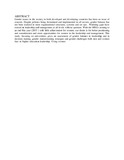| dc.description.abstract | Education plays a critical role in t
he
development of any society.
It is for this reason that the
World Conference held in Jomtien Thailand in 1990
came up with
E
ducation
for A
ll (EFA)
declaration. This followed the realization that quality basic education was important for the
success of human
endeavors.
It is for this reason that the Dakar For
um and the MDGs set EFA
by 2015.
It is thus an appropriate time for reflection on possibilities and options beyond 2015.
A
gainst this b
ackground
,
Kenya introduced Free Primary E
ducation (FPE) in 2003
and t
his
led
to an increase in enrolment. However, increasing access to primary education doesn’t necessarily
prove valuable unless it is seen as
a promising path for individuals to realize better, more
productive lives and as a driver of national economi
c development.
This paper argues that such
access to primary education should go hand in hand with
quality
. Recent policy documents such
as Sessional Paper Number 14 of 2012 and Basic Education Act 2013 spell out the government’s
commitment to provision of
quality basic education for all citizens.
However, studies reveal that
the quality of basic education in the country remains far below the expected standards.
G
etting
children through primary schools will
not be
enough. While education is central to the c
ountry’s
agenda and noticeable achievements have been made in the context of EFA, significant
challenges remain. There are vast disparities within the country as concerns access to schooling
and the quality of education in resulting levels of learning achi
evement
.
The post 2015 agenda in
Kenya therefore should take into account that achieving EFA remains a key yet unfinished
agenda for basic education in the country, requiring strengthened efforts in order to meet its
goals. Therefore, future orientations f
or education require a widening of the EFA agenda in | en_US |

